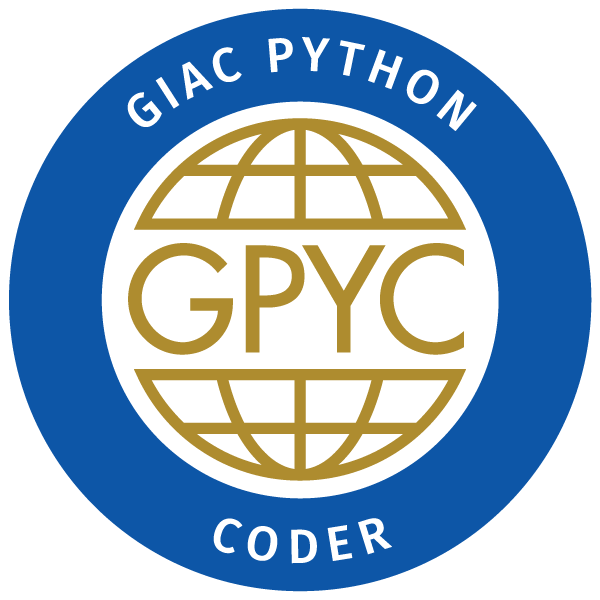Areas Covered
- Python language essentials
- Packet and data analysis
- Website and database interaction
- Regular expressions
- Exception handling and debugging
Who is GPYC for?
- Information security professionals
- Python developers
- Forensic analysts
- Network defenders
- Penetration testers
Exam Format
- 1 proctored exam
- 75 questions
- 2 hours
- Minimum passing score of 67%
Delivery
NOTE: All GIAC Certification exams are web-based and required to be proctored. There are two proctoring options: remote proctoring through ProctorU, and onsite proctoring through PearsonVUE. Click here for more information.
GIAC certification attempts will be activated in your GIAC account after your application has been approved and according to the terms of your purchase. Details on delivery will be provided along with your registration confirmation upon payment. You will receive an email notification when your certification attempt has been activated in your account. You will have 120 days from the date of activation to complete your certification attempt.
Exam Certification Objectives & Outcome Statements
- Control Structures and Iteration The candidate will be able to create and analyze simple control structures, including conditionals (if/else/elif) and for/while loops using Python.
- Creation of Executables The candidate will have a basic understanding of creating a Python executable for Windows clients with a focus on penetration testing. This includes an understanding of backdoor functionality, the conversion of a Python program to an executable file, and using Python to create an executable that will evade most modern anti-virus signatures.
- Data Analysis with Python The candidate will demonstrate the ability to use Python for various data analysis techniques including parsing binary data with the struct module, common file formats, log analysis and statistics with freq.py, counters and sets, long tail and short-tail analysis.
- Data Structures The candidate will be able to create and manipulate variable types and data structures, including bytes, byte arrays, byte encoded unicode characters using UTF-8 and Latin-1, integers, Python 3 strings, sets and sequential data structures, including dictionaries, lists, and tuples.
- Database Interaction The candidate will understand how to create a Python program to query databases using SQL libraries.
- Exception Handling The candidate will have a basic understanding of Python exception handling capabilities, and how to build these into a program.
- Functions, Classes and Objects The candidate will be able to demonstrate an understanding of Python functions, classes, and object oriented programming.
- Network Interfaces The candidate will be able to implement TCP and UDP network based communications using Pythons socket module.
- Packet Analysis with Python The candidate will understand how to use extended functionality of Python and Scapy to create, read, analyze, and manipulate captured network traffic.
- Python Basics The candidate will be able to implement the more fundamental elements of Python, including creating, debugging and executing a program, and user/file input and output.
- Regular Expressions The candidate will have a basic understanding of regular expressions, and how to implement them in searches with Python.
- Website Interaction The candidate will understand how to use Python as a "browser" to interact with URLs and websites, handle cookies, and manipulate or capture traffic.
Other Resources
- Training is available in a variety of modalities including live conference training and OnDemand
- Practical work experience can help ensure that you have mastered the skills necessary for certification
- College level courses or self paced study through another program or materials may meet the needs for mastery.
- Get information about the procedure to contest exam results.
Practice Tests
- These tests are a simulation of the real exam allowing you to become familiar with the test engine and style of questions.
- Practice exams are a gauge to determine if your preparation methods are sufficient.
- The practice bank questions are limited so you may encounter the same question on practice tests when multiple practice tests are purchased.
- Practice exams never include actual exam questions.
- Purchase a GPYC practice test here.
- GIAC recommends leveraging additional study methods for test preparation.


